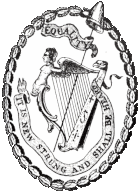
Back جمعية الأيرلنديين المتحدين Arabic Societat dels Irlandesos Units Catalan Society of United Irishmen Czech Cymdeithas y Gwyddelod Unedig Welsh Society of United Irishmen German Sociedad de los Irlandeses Unidos Spanish Society of United Irishmen Basque Society of United Irishmen Finnish Société des Irlandais unis French Cumann na nÉireannach Aontaithe Irish
Society of United Irishmen Cumann na nÉireannach Aontaithe[1] | |
|---|---|
 | |
| Founded | 1791 |
| Dissolved | 1804 |
| Newspaper | Belfast: Northern Star. Cork: Harp of Erin. Dublin: The Rights of Irishmen, or National Evening Star; Union Star; Press. Roscrea: Southern Star. |
| Ideology | Irish nationalism Republicanism Radicalism |
| International affiliation | Allied to the French First Republic, United Scotsmen, United Englishmen/United Britons |
| Party flag | |
 | |
| Part of a series on |
| Irish republicanism |
|---|
 |
The Society of United Irishmen was a sworn association, formed in the wake of the French Revolution, to secure representative government in Ireland. Despairing of constitutional reform, and in defiance both of British Crown forces and of Irish sectarian division, in 1798 the United Irishmen instigated a republican rebellion. Their suppression was a prelude to the abolition of the Irish Parliament in Dublin and to Ireland's incorporation in a United Kingdom with Great Britain.
Espousing principles they believed had been vindicated by American independence and by the French Declaration of the Rights of Man, the Presbyterian merchants who formed the first United society in Belfast in 1791 vowed to make common cause with their Catholic-majority fellow countrymen. Their "cordial union" would upend the landed Anglican Ascendancy and hold government accountable to a reformed Parliament.
As it radiated out from Belfast and from Dublin, the society drew on the structure and ritual of freemasonry to recruit among tradesmen, artisans and tenant farmers, many of whom had been organised in their own clubs and secret fraternities. Following its proscription in 1794, its goals were restated in uncompromising terms. Catholic emancipation and parliamentary reform became the call for universal manhood suffrage and a republic. Sharing a common democratic programme, and trading on the prospect of French assistance, agents were active in organising "United" societies in Scotland and in England with whom it was hoped action might be co-ordinated.
Beginning in May 1798, martial-law seizures and arrests forced the conspiracy in Ireland into the open. The result was a series of local risings suppressed in advance of the landing, in August, of a small French expeditionary force.
In the wake of the rebellion, the British government pressed a union with Great Britain upon the Irish Parliament and transferred its unreformed, exclusively Protestant, representation to Westminster. In 1803, a renewed republican conspiracy, organised on strictly military lines, failed to elicit a response in what had been the United heartlands in the north, and misfired with an aborted rising in Dublin.
Exiles formed a United Irish society in the United States where, during the Quasi War with France, it attracted the hostile attention of the governing Federalist Party. There were reports of United Irish oath taking as a prelude to mutinies in the British Navy, in Jamaica, in Newfoundland, and in New South Wales.
Since the rebellion's centenary in 1898, Ireland's major political traditions, unionist, nationalist and republican, have claimed and disputed the legacy of the United Irishmen, and of the union they sought to effect between Catholic, Protestant and Dissenter.
- ^ "Terminology". An Sionnach Fionn. 26 December 2013.